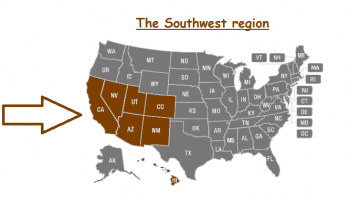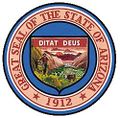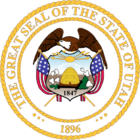Ballotpedia's 2012 Regional Ballot Measure Breakdown Series: Southwest region
October 24, 2012
Edited by Al Ortiz
- Editor's note:This is the second in a seven part series. The Regional Breakdown series will be published every Wednesday and Friday leading up to the November 6 general election.
Southwest Region, UNITED STATES: The nation is one more week closer to the big day of November 6, 2012, when the general election will take place. Until that time winds down to the big day, every piece of information and every detail will count for voters to inform themselves before going to the polls.
In order for voters to get informed about statewide issues, found at the very bottom of their ballots, Ballotpedia continues this year's regional ballot measure breakdown series, highlighting the southwest region of the country.
Originally started in 2010, when 188 measures graced statewide ballots in 38 states, the breakdown series reviews ballot measures by region. This year, there are 186 ballot measures on the ballot in 38 states, with 176 of those measures set to be decided on November 6 in 37 states.
Ballotpedia divided the nation up into six regions in 2012: Northwest, Southwest, South Central, Midwest, Northeast and Southeast. In each report you will find what measures are on your state's ballot, and what proposed amendments or statutes your surrounding area will vote on, which may or may not have an impact on future ballots in your state or area.
The states that Ballotpedia has included in the Southwest region are: Arizona, California, Colorado, Hawaii, Nevada, New Mexico and Utah.
Below is a breakdown of how many statewide measures are on the ballot in the Southwest and how that compares to 2008 and 2010, followed by summaries of each state.
Overview
| State | Number of measures in 2008 | Number of measures in 2010 | Number of measures in 2012 |
|---|---|---|---|
| Arizona | 8 | 11 | 9 |
| California | 21 | 14 | 11 |
| Colorado | 14 | 9 | 3 |
| Hawaii | 2 | 2 | 2 |
| Nevada | 4 | 4 | 1 |
| New Mexico | 9 | 9 | 8 |
| Utah | 5 | 4 | 2 |
| Totals: | 63 | 53 | 36 |
Arizona
Arizona voters are no strangers to controversy when it comes to ballot measures on the statewide ballot. In 2010, residents decided to approve Proposition 100, which temporarily raised the state sales tax. The highly scrutinized measure is set to expire soon, but not unless voters approve this year's Proposition 204, which would renew the 2010 voter-approved one-cent sales tax to provide funding for education for students in the state who meet certain requirements, scholarships for college students and reinvestment in vocational education and new jobs, according to reports.
Another highly debated measure set to be placed before voters is Proposition 121, which would implement a top-two style open primary system. In a top-two open primary, candidates for a government position run on the same primary ballot regardless of party affiliation. All registered voters are then able to cast their vote for the candidate of their choice. The two candidates with the most votes are then placed on the November general election ballot, regardless of party affiliation.
Proposition 120 is quickly gathering both supporters and opponents in the state, as the measure tackles the issue of state resources, and exactly who they belong to. The measure would declare state sovereignty over the state's natural resources based on the argument of "equal footing." Natural resources would include land, air, water, minerals and wildlife. According to reports, this would also include the Grand Canyon.
In all, Arizonians have nine statewide ballot measures to get informed about this fall.
The following are quick facts about Arizona state ballot measure information:
- Initiative and referendum state: Yes
- Last ballot measure election: November 2, 2010 general election
- Ballot measure approval rating since 2000: 54%
Ballot measure notes:
- Arizona voters voted on "Obamacare" in 2010, when they approved Proposition 106. This year four other measures are deciding on that same issue: Alabama, Florida, Montana and Wyoming
- Arizona Governor Jan Brewer was the main advocate behind Proposition 100, which temporarily raised the sales tax in the state. However, she is against Proposition 204, which would renew that sales tax.
The ballot lineup
November 6, 2012 ballot measures
|
What people are saying
|
California
The Golden State is a whopper of a ballot measure state, year in and year out, as each ballot measure election contains a plethora of statewide issues for residents to chime in on. This year, California voters have decided on two ballot measures on the primary election ballot. Coming up in November, though, voters get to decide on 11 more propositions.
Although many are being talked about on the golden coast, three triplet tax measures are stealing the silver screen of California politics. The three tax measures are Proposition 30, Proposition 38, and Proposition 39.
Proposition 30 was introduced and circulated by California Governor Jerry Brown, who proposes to raise California’s sales tax to 7.5% from 7.25%, a 3.45% percentage increase over current law. Proposition 38, brought into the spotlight by Molly Munger, would increase the state income tax rates for most Californians which would end after 12 years, unless voters reauthorize it. Proposition 39, primarily backed by Thomas Steyer, would require out-of-state businesses to calculate their California income tax liability based on the percentage of their sales in California.
However, taxes isn't the only issue stirring up a whirlwind of debate in the state, as the state death penalty and genetically engineer food are also topics that can be found on the November 6 general election ballot. More controversial topics on the California ballot can be found here.
The following are quick facts about California state ballot measure information:
- Initiative and referendum state: Yes
- Last ballot measure election: June 5, 2012 primary election
- Ballot measure approval rating since 2000: 52%
Ballot measure notes:
- California voters have seen ballot measures on the ballot in every year this century except for 2001, 2007 and 2011.
- For what could be the first time in California's history of direct democracy, the ballot measure lineup features only citizen initiatives.
The ballot lineup
November 6, 2012 ballot measures
|
What people are saying
|
Colorado
Colorado voters will decide an important ballot measure this year; Amendment 64, on the November 6, 2012 ballot as an initiated constitutional amendment, which would legalize recreational marijuana in the state. The measure will ask whether or not to legalize the use and possession of, at most, an ounce of marijuana for residents who are 21 and older. President Barack Obama's and Republican candidate Mitt Romney's stance regarding marijuana legalization, regulation and taxation like alcohol is expected to influence the young voter population in Colorado, according to reports.
In 2006, 59% of Colorado voters rejected Amendment 44, which would have legalized the possession of up to one ounce of marijuana for those 21 or over. Medical marijuana is legal in Colorado under the terms of a bill signed into law by Gov. Bill Ritter, but some marijuana activists say that the time is right to expand the legality of marijuana to cover recreational use also. Opponents of the measure state that an expansion of marijuana legalization could lead to legal and government problems.
The following are quick facts about Colorado state ballot measure information:
- Initiative and referendum state: Yes
- Last ballot measure election: November 1, 2011 general election
- Ballot measure approval rating since 2000: 37%
Ballot measure notes:
- The last time Colorado voters saw a measure on the ballot was in 2011, when Proposition 103 was defeated.
- This is the third time this century that Colorado voters have voted on the issue of marijuana.
The ballot lineup
November 6, 2012 ballot measures
|
What people are saying
|
Nevada
There is only one ballot measure on the Nevada ballot this year, with Question 1 asking voters whether or not to provide that the Nevada Legislature may convene a special legislative session upon a petition signed by two-thirds of the Legislators of each chamber, on "extraordinary occasions."[1]
Special sessions would be limited to 20 calendar days under the measure, unless that session is called to expel a legislator or impeach or remove the Nevada Governor. The impeachment provision would also include other constitutional officers and judicial officers. Another way those sessions could be extended is if a supermajority of 66% of members in both chambers approve of doing so.
The following are quick facts about Nevada state ballot measure information:
- Initiative and referendum state: Yes
- Last ballot measure election: November 2, 2010 general election
- Ballot measure approval rating since 2000: 42%
Ballot measure notes:
- Two competing measures were on the ballot in 2012 for state voters, but they were soon struck from the ballot due to litigation.
- One measure that was struck from the ballot would have allowed a 20,000-seat sports arena on the Las Vegas Strip. Specifically the initiative would have imposed a 0.9 cent sales tax in a taxing district near the proposed arena. The competing measure would have banned special tax districts.
The ballot lineup
November 6, 2012 ballot measures
|
What people are saying
|
New Mexico
Eight statewide ballot questions have been certified for the November 6, 2012 ballot in the state of New Mexico, with three being bond issues and five being legislatively referred constitutional amendments.
In all, the bond issues voters will decide on total out to $224,165,000 in authorized bonds. Each bond would be used for senior citizen facility improvements, public library resource acquisitions and certain higher education improvements.
Three measures deal with the Public Regulation Commission. One of those measures, Amendment 2, would raise the qualifications required to be public regulation commissioner. Reports stated that supporters were unsatisfied with the qualifications required to become a commissioner.
Those measures were placed on the ballot due to two former PRC commissioners – Carol Sloan and Jerome Block Jr. – pleading guilty to felony charges or being convicted of such charges during the past three years. However, opponents say that those felony charges had nothing to do with commissioner qualifications.[2]
The following are quick facts about New Mexico state ballot measure information:
- Initiative and referendum state: Yes (referendum only)
- Last ballot measure election: November 2, 2010 general election
- Ballot measure approval rating since 2000: 81%
Ballot measure notes:
- Voters in New Mexico have had measures on the ballot in only even-numbered years this century, except for 2003.
- 2003 was the only year with measures on the ballot this century to not have bond measures for voters to decide.
The ballot lineup
November 6, 2012 ballot measures
|
What people are saying
|
Hawaii
This year voters in Hawaii will see two constitutional amendment questions on their ballot. Though both are relatively low key on the national stage, they at least could carry important ramifications for the citizens of Hawaii.
Beginning first with HB 2594, also known as the Dam and Reservoir Owners Assistance Amendment, voters will decide if the state should add dam and reservoir owners to the list of persons, organizations, and projects that can receive proceeds from the issuance of special purpose revenue bonds. These bonds are ways in which the state can become involved with and assist privately-owned enterprises.
Currently, most dams and reservoirs are run by private companies that have a legal obligation to maintain them. The issuance of these bonds would allow the state to repair dams when their operator companies fail to do so. Some impetus for the amendment may come from an incident in 2006 in which a breach in the privately-run Ka Loko Dam resulted in the deaths of eight people. In following civil suits, it came to light that the dam's owner failed to respond to requests by the state to inspect the dam. The debate over the measure revolves around government responsibility and general safety vs. private owner responsibility due to the fact that taxpayers would be footing the bill if any such bonds were issued.
The other question on the ballot, SB 650, or the Appointment of Retired Judges Amendment, asks voters if they should allow for the state to appoint retired judges to temporarily preside over courts of the same level at which they previously sat. The amendment does not change the mandatory retirement age of judges, which is 70, but rather deepens the pool from which temporary replacement judges can be selected. If any such judges are appointed, they will only be allowed to serve for a maximum of three months.
The following are quick facts about Hawaii state ballot measure information:
- Initiative and referendum state: No
- Last ballot measure election: November 2, 2010 general election
- Ballot measure approval rating since 2000: 84%
Ballot measure notes
- A constitutional amendment repealing the mandatory retirement age for judges was voted down by the public in the 2006 general election.
- Also in 2006, voters approved the adding of agricultural enterprises to the list of legal recipients of revenue from special purpose revenue bonds.
The ballot lineup
November 6, 2012 ballot measures
|
What people are saying
No campaign quotes found in state reports. |
Utah
Two measures have found their way onto the ballot for November 6, both of them aiming to amend the Utah Constitution.
Constitutional Amendment A would require that a portion of the revenue from all of the state's severance taxes be deposited into the permanent state trust fund beginning July 1, 2016.
Constitutional Amendment B would exempt military personnel from paying state property taxes. In addition, the exemption would apply to any service member who has been called for active duty in the military.
The following are quick facts about Utah state ballot measure information:
- Initiative and referendum state: Yes
- Last ballot measure election: November 2, 2010 general election
- Ballot measure approval rating since 2000: 88%
Ballot measure notes
- The last time Utah voters rejected a measure was in 2007.
- That rejected measure would have implemented a school voucher bill that had been passed by the Utah legislature and signed by the governor on February 12, 2007.
The ballot lineup
November 6, 2012 ballot measures
|
What people are saying
No campaign quotes found in state reports. |
See also

|
- 2012 ballot measures
- State ballot measure reports
- Ballotpedia's 2011 Ballot Measure Breakdown: All states
- Ballotpedia's 2010 Regional Breakdown: All regions
- Portal:Elections
- Initiative and referendum
- Ballot initiative
Footnotes
| |||||
















